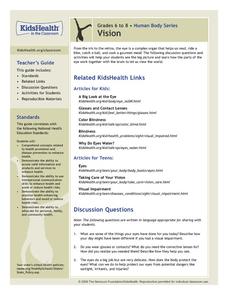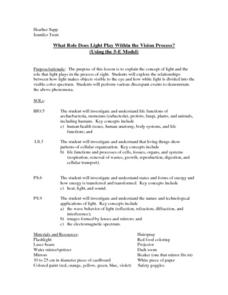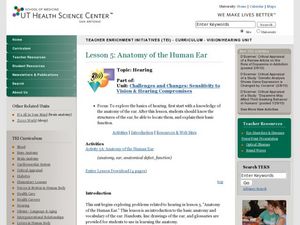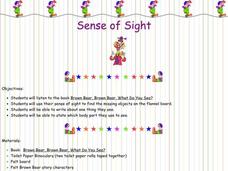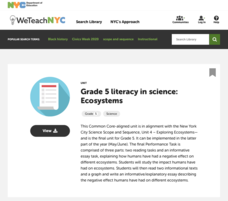California Academy of Science
Color Vision Genetics Evolution Simulation
At one point, all mammals carried only two color receptors, but now most humans carry three. An informative presentation and hands-on activity demonstrate how this evolved through genetics. By participating in the activity, pupils...
LABScI
Vision Lab: The Eye
Our bodies have some amazing capabilities, but there are some limitations. Explore the limitations of the human eye through the eighth lab activity in a series of 12 biology lessons. Individuals measure their own peripheral vision...
Core Knowledge Foundation
The Human Body—Systems and Senses Tell It Again!™ Read-Aloud Anthology
Nine lessons over three weeks explore the human body through read-alouds. Third graders listen to and discuss a reading followed by extension activities, including word work and comprehension practice. Learners draft a narrative essay.
Nemours KidsHealth
Vision
From the iris and retina to glasses and contact lenses, learners will be excited to see what activities are in store for them as they learn about the complex organ of the human eye.
PHET
Color Vision
Humans can only see visible light, but some insects can see ultraviolet light. Through a simulation, pupils explore how we see colors using one bulb. It moves on to demonstrate how we see colors by mixing three different bulbs (red,...
Curated OER
What Role Does Light Play Within the Vision Process?
Students are introduced to the relationship between light and vision. In groups, they participate in experiments to discover how different wavelengths are divided in the visible spectrum. They record their answers and discuss their...
Meadows Center for Preventing Educational Risk, University of Texas at Austin
Sight Word Fluency Lists 31 to 45
Practice makes perfect. Scholars get a lot of practice with sight word recognition as they continue to read words from each list until they master all words. Lists offer both new and review words.
Meadows Center for Preventing Educational Risk, University of Texas at Austin
Sight Word Fluency Lists 46 to 60
Reading takes place one word at a time. Increase scholar word recognition fluency and create better readers with sight word fluency lists. Readers continue to practice each list until they prove mastery.
Meadows Center for Preventing Educational Risk, University of Texas at Austin
Sight Word Fluency Lists 16 to 30
Record keeping and data is essential to tracking scholar growth. Educators record pupil mastery of sight word recognition on nine pre-made sheets. Teachers and parents easily view data, progress, and word mastery.
Exploratorium
Cardboard Tube Syllabus
Construct paper tubes and then try out a few optical illusion tricks:
See a virtual hole in your own hand
Get a grasp of how the eyes combine images
Notice that one eye is dominant over the other
Reveal how your eyes adjust to...
Curated OER
Now You See Me, Now You Don't
Bioluminescence fascinates most upper elementary scientists. Display images of different glowing deep-sea organisms and discuss their environment. Young biologists then experiment with images and different colors of filtered light. In...
Curated OER
Anatomy of the Human Ear
Learners examine the human ear and its function. For this anatomy of the human ear lesson, students view drawings of the ear and learn about the structure of the ear through handouts and glossaries. This lesson is part of a vision and...
Curated OER
Sense of Sight
Students examine the sense of sight. In this human biology lesson, students read the book Brown Bear, Brown Bear, What Do You See? and discuss all of the animals seen in the story. Students use binoculars and take several digital photos...
Curated OER
The Human Eye
In this reading comprehension worksheet, students learn about the human eye by reading a 2 page passage and studying a diagram of the eye. Students answer 8 questions, and label a diagram of the eye.
Curated OER
Martin Luther King Jr.: From Civil Rights to Human Rights
Learners read essays and participate in a discussion that examines Dr. Martin Luther King, Jr.'s stance on both civil rights and the broader issue of human rights. They conduct research about King's life and work, analyze quotes from his...
Amnesty International
Respect My Rights, Respect My Dignity: Module One – Poverty and Human Rights
Creating an environment where learners feel both educated and empowered challenges any teacher when discussing a sometimes bleak topic. A respectful resource provides them with the details and permits them to make a plan of action....
Curated OER
Geography Experience: Low Vision
The world is a big and beautiful place; but how do you begin to understand it when you have low vision? Here is a great set of ideas focused on transforming any small room into a sensory paradise, themed to incite understanding about...
Curated OER
Hands on Your Heart - Biology Teaching Thesis
Students are able to recite the circulation of blood through the heart's various cavities and valves. They are able to appreciate what the actual valves and chambers of the heart look like. Students also have a clear vision of why the...
Curated OER
Vision and Optics: Light and Lenses
Students gain a conceptual comprehension of the functioning of the Human Eye in relation to optics and optical vision correction. They explore optics with light sources and various lenses, relating these to visual acuity, accommodation,...
Curated OER
Human Rights Day
In this Human Rights Day worksheet, students complete activities such as reading a passage, phrase matching, fill in the blanks, correct words, multiple choice, spelling, sequencing, scrambled sentences, writing questions, survey, and...
Curated OER
How We See: The First Steps of Human Vision
Pupils notice how various images and colors update constantly as they are affected by factors such as distance, background and lighting. They also examine how optometrists developed a standard to evaluate eyesight.
Early Childhood Learning and Knowlege Center
My Body My Senses
In a comprehensive unit of activities, learners explore the five senses. Youngsters discover the many different body parts and their functions that allow humans to have sense of sight, touch, smell, taste, and hearing. The best way to...
New York City Department of Education
Grade 5 Literacy in Science: Ecosytems
How do humans affect ecosystems? Learners read two articles and interpret a graph to develop essays on the human impact on ecosystems. They read about human impact on tigers and manatees as a basis for their overarching papers.
Curated OER
Making Cents of the Senses
Students explore sight and hearing. In this senses lesson, students read Brown Bear Brown Bear, discuss how eyes are used for sight, and chart the eye color of the students in the class. Students discuss how hearing is important, take a...





